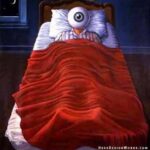Effects of exposure to room light before bedtime
 Millions of people habitually expose themselves to room light between dusk and bedtime, yet the effects of this behavior on melatonin are not well recognized.
Millions of people habitually expose themselves to room light between dusk and bedtime, yet the effects of this behavior on melatonin are not well recognized.
Researchers at Harvard Medical School in Boston, measured the effects of room light in the late evening.
First, the details.
- 116 healthy adults living in a General Clinical Research Center were assigned to a treatment group for at least 5 consecutive days.
- Exposure to room light during the 8 hours preceding bedtime.
- Exposure to dim light during the 8 hours preceding bedtime.
- Melatonin blood levels were measured and the association with duration, onset and offset, suppression, and phase angle of entrainment (synchronization or alignment of the internal biological clock rhythm) was determined.
And, the results.
- Exposure to room light before bedtime suppressed melatonin.
- Compared with dim light, there was a later melatonin onset in 99% of individuals and shortening melatonin duration by about 90 minutes.
- Exposure to room light during the usual hours of sleep suppressed melatonin by greater than 50% in most (85%) trials.
The bottom line?
Melatonin is a hormone produced at night by the pineal gland in the brain. Among other things, it controls the sleep-wake cycle.
The authors concluded, “These findings indicate that room light exerts a profound suppressive effect on melatonin levels and shortens the body’s internal representation of night duration.”
Just about everybody in modern society is exposed to room light before bedtime.
The implications of this, according to the authors is that; “chronically exposing oneself to electrical lighting in the late evening disrupts melatonin signaling and could therefore potentially impact sleep, thermoregulation, blood pressure, and glucose homeostasis.”
More research is needed to determine the significance of these findings.
1/16/11 21:38 JR